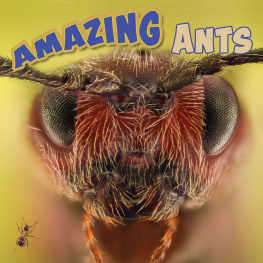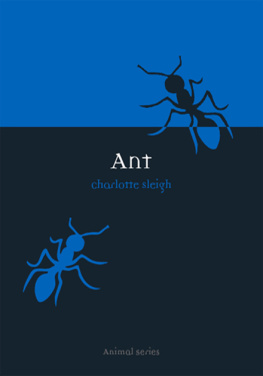Secret Lives of Ants
Secret Lives of Ants
Jae Choe

foreword by JANE GOODALL
photographs by DAN PERLMAN
translated by DAN LEONARD

This book has been brought to publication with the generous support of Korea Literature Translation Institute (KLTI) for the project Books from Korea, 2005.
Copyright 1999 by Jae Chun Choe. All rights reserved.
English Translation Copyright 2010 by ScienceBooks
Co., Ltd. English translation edition is published by agreement
with SCIENCEBOOKS CO., LTD., SEOUL.
2012 The Johns Hopkins University Press
All rights reserved. Published 2012
Printed in the United States of America on acid-free paper
9 8 7 6 5 4 3 2 1
The Johns Hopkins University Press
2715 North Charles Street
Baltimore, Maryland 21218-4363
www.press.jhu.edu
Library of Congress Cataloging-in-Publication Data
Choe, Jae C.
Secret lives of ants / Jae Choe ; foreword by Jane Goodall ;
photographs by Dan Perlman ; translated by Dan Leonard.
p. cm.
Includes bibliographical references.
ISBN-13: 978-1-4214-0428-8 (hardcover : alk. paper)
ISBN-10: 1-4214-0428-1 (hardcover : alk. paper)
1. AntsBehavior. 2. Social behavior in animals. I. Title.
QL568.F7C55 2012
595.796dc23 2011021207
A catalog record for this book is available from the British Library.
Title page illustration: After her nuptial flight, the queen ant uses her middle and hind legs to break off her wings, as she prepares to start her new home.
Special discounts are available for bulk purchases of this book. For more information, please contact Special Sales at 410-516-6936 or specialsales @press.jhu.edu.
The Johns Hopkins University Press uses environmentally friendly book materials, including recycled text paper that is composed of at least 30 percent post-consumer waste, whenever possible.
To my mother, a queen who gave birth to four males
who never held a broom, who spent her whole life
working like a worker ant
CONTENTS
How the Futuristic Economics of Ants Maximizes Their Returns
From Joint Ventures to Multinational Enterprises
The Massive Underground Mushroom Farms of the Leaf-cutter Ants
Masters of Dairy Farming Second Only to Mankind
Standing Watch for Room and Board
The Terrifying March of the Army Ants
The Clever Designs of Ant Communication
Sense of Direction and Biological Clocks
Maids, Nannies, Laborers, Soldiers
Parasites That Have Cracked the Ants Secret Code
Predators and Parasites
Females in the Service of an Amazon Queen
Divine Right of the Queen? Or the Will of the Masses?
Yesterdays Comrade, Todays Enemy
The Queens Battle for the Throne
From Full-Scale Slaughter to Bloodless Warfare
FOREWORD
I first met Jae Choe in 1996 when he interviewed me for a science magazine during my first visit to South Korea. I was immediately impressed by his warmth, his passion for the natural world, and his conviction that it is important to share scientific findings with the general publica conviction that I share. When the interview was over he showed me an issue of National Geographic that, coincidentally, featured articles by each of us. We had a wonderful discussion about our work and our shared love for the natural world. Each time Ive returned to Korea to lecture and speak with young people, Jae has acted as my liaison and interpreter. Of course, I cannot understand what he is saying when he translates, yet the reactions of people listening prove that he is able to convey not just my words but alsoalmost more importantlythe spirit of my message to audiences all over the country.
My own experience with ants is limited and very unscientific. There were wood ants that piled up small twigs and pine needles to form big, mound-shaped nests in the woods where I and my friends played when we were children. Their bite was painful and we used to avoid them. Then I decided that a friendly approach was necessary and trustingly held my finger toward one of themwhereupon she promptly clamped her jaws into my flesh!
In Gombe National Park, the site of my ongoing research, army, or driver, ants are commonly preyed upon by chimpanzees. The chimpanzees choose long, straight sticks and, by carefully peeling the bark and any projecting twigs, fashion smooth tools. These are pushed into an underground nest and withdrawn along with a mass of insects that have bitten on in defense of their nest. The chimpanzee pulls the stick through his free hand, rushes the ants into his mouth, and chews as fast as possible. He can endure this painful feast for only a few minutes before rushing off to pluck the biting ants from his body. I quickly learned that it is important to try to avoid the trails of army ants encountered in the forest. It seems to me that they have an unpleasant sense of humor since, if you do inadvertently walk through a trail, the ants are quick to climb your legbut you are not aware until the leader reaches about knee level or higher, at which point the stream of ants that have climbed, as though in response to some signal, all bite at the same time!
Weaver ants taste hot and lemon-like and are another tasty chimpanzee snack. They make nests by sticking living leaves together while still attached to bush or tree. The chimpanzee picks the whole nest and, having crushed many of the ants by pulling it several times through hand or foot, then carefully opens the leaves and picks off the ants. Chimpanzees eat carpenter ants by poking short, thin sticks into their nests in dead wood and eating them from trunk or branch when they swarm out. This is a new behavior for the chimpanzees of our main study group, learned from a female who had acquired the skill in her natal community.
It is wonderful to watch the clicker ants that set out, in small raiding parties, to capture termites. The successful raiders then return to their nest, each with an unfortunate victim in her jaws. Infant chimpanzees love to poke sticks into trails of ants and watch with absorbed fascination as they scurry around seeking the source of the disturbance. My son, as a small child, did exactly the same.
It is his passion for the natural world that Jae brings to the study of ant biology. As he admits in Secret Lives of Ants, ants are not beautifulby common human standards, at any rate. Chimpanzees, especially infants with their big luminous eyes, can touch the heart and serve as a flagship species in a campaign to save a rainforest, but it is extremely unlikely that zoomed-in close-ups of bristled ant faces, antennae splayed, could have the same effect. Sadly, most people are not even interested in ants and have no idea of their fascinating social structures and behavior. Yet ants are extraordinarily adaptable and successful and can be found in every environment except for the liquid, molten, or frozen places of our Earth. How fortunate that Jae is not only passionate about ants but equally passionate to rouse interest in the general public.
The result is this enchanting book. Jae draws simple analogies between human and ant societies, picking out aspects of our human societies such as agriculture, warfare, and the formation of alliances in order to help us understand similar patterns in ant societies. Ants, like humans, have developed sophisticated behaviors to help them deal with problems caused by living in crowded conditions similar to those we experience in cities. And as we read in these pages about some of the incredible achievements of ant communities we become more and more fascinated and amazed. Leaf-cutter ants, we learn, are farmers, harvesting mushrooms: their queens have been handing down knowledge of mushroom species to their daughters for more than 25 million years. Other ant species herd aphid livestock to provision their colony with a steady supply of food. Army ant colonies wage wars and have been observed to use signature war-plan tactics. And honeypot ants actually have individuals who call for reinforcements if a battle is not progressing well.
Next page








